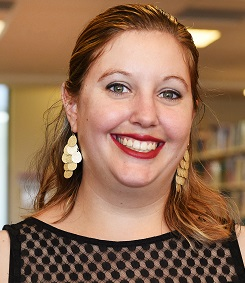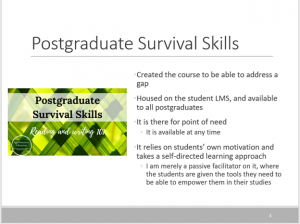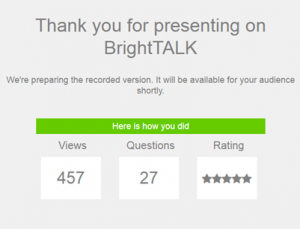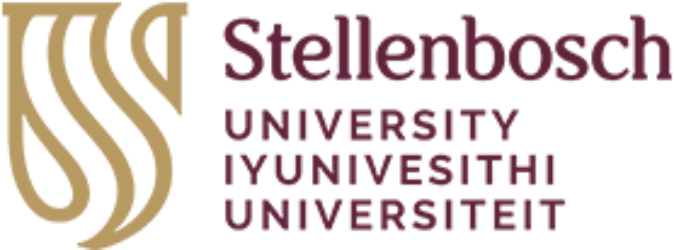[:en] On Thursday 21 May, Elizabeth Moll-Willard (Faculty Librarian: AgriSciences) presented part of a webinar titled “Setting students up for success with science literacy”. Elizabeth spoke about creating a self-directed course for postgraduate students to equip themselves with essential research and information literacy skills.
On Thursday 21 May, Elizabeth Moll-Willard (Faculty Librarian: AgriSciences) presented part of a webinar titled “Setting students up for success with science literacy”. Elizabeth spoke about creating a self-directed course for postgraduate students to equip themselves with essential research and information literacy skills. The course was created with Kathryn Wirth’s input (the Blended Learning Co-ordinator for the AgriSciences faculty) and placed on the SUNLearn postgraduate module. The point of need, standalone course covers the following areas:
The course was created with Kathryn Wirth’s input (the Blended Learning Co-ordinator for the AgriSciences faculty) and placed on the SUNLearn postgraduate module. The point of need, standalone course covers the following areas:
- Finding information, which covers how to put together search strategies, the different types of databases, and recommending which ones are best to use for quality, peer-reviewed information.
- Surviving information overload, which focuses on how to analyse and read articles – using tools such as the basic CRAAP (Currency, Relevance, Authority, Accuracy, and Purpose) test as well as an in-depth explanation of how to test for bad science, and then knowing when the point of saturation of knowledge is reached.
- Following academic breadcrumbs, which includes searching using citations and reference lists.
- Breaking through the reading barrier – which shifts to working with the information, breaking it down into how to skim read, how to map articles by theme or by method, and then reminding students of the importance of doing the test of “does this fit into my research hypothesis”.
- Principles of writing – which cover basic technical issues such as what kind of language should be used for writing, all the way to the technical structure of a paragraph (topic sentence, etc.), to an outline of a literature review and what is expected in the different sections. It also covers writing a scientific article, and how that differs from a thesis.
The role of the library in relation to Science Literacy, and specifically the creation of such a course was the main aspect that was discussed in Elizabeth’s presentation.  The webinar was well attended, with 457 participants, and the rating received from most participants was 5 stars. The presentation also resulted in a Library Connect blog article which can be viewed here.
The webinar was well attended, with 457 participants, and the rating received from most participants was 5 stars. The presentation also resulted in a Library Connect blog article which can be viewed here.
The webinar was recorded and can be viewed here.
Elizabeth Moll-Willard[:]
